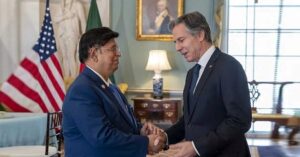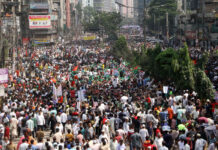By Ahmad Shihab 14 April 2023
Prime Minister Sheikh Hasina went hysterical on the parliament floor on April 10, 2023. She perhaps sensed that the US Secretary of State Antony Blinken called her foreign minister A K Momen to Washington on April 10 to insist on fairness and credibility in the election to be held in December or January. That sounded like a Marching Order for Hasina.
Sheikh Hasina has reasons for her childish tantrums. We say in Bangla, চোরের মনে পুলিশ পুলিশ (A mischief maker sees nightmares all the time). Since 2009, she thrived on autocracy; democracy, freedom, rule of law and good governance were relegated to textbooks. The notorious Rapid Action Battalion (RAB) and fearsome police swoops on anyone trying to point at the regime’s wrongdoings, or even pen a line of parody on the ruling family, with the draconian tool of Digital Security Act (DSA) and take to the torture cells before throwing in the crowded jails. Many have already succumbed to the mistreatment. The US, the UN, freedom and rights organizations the world over continue their outcries against rights violations but with little effect. Subsequent massive election frauds returned her to power.
Indeed, Blinken did not mince words when he said that the whole world was looking at the next election in Bangladesh to be free and fair. That is death knell to the Hasina regime, which is detested by the vast majority for its 15-year long oppressive and corrupt rule. The West, particularly the US, tolerated so far, but perhaps no more.
Momen’s attempt at explaining “Joy Bangla”’ to signify the sacrifice of the people in 1971 for democracy and freedom was counterproductive. In reality, Sheikh Mujibur Rahman totally destroyed those values in post-independence Bangladesh. (President Joe Biden used the Joy Bangla salutation at the end of his greeting message on the 51st anniversary of Bangladesh’s independence.)
The theme of the talks, by all indications, revolved around credible election, political freedom and persecution under the DSA in Bangladesh. Such pleasantries as hosting Rohingyas, climate change and half a century of development partnership were mentioned in passing.
To me, there are three major players in the game. First, India. It has a huge stake in Bangladesh, as well as in Sheikh Hasina, who has been serving at its pleasure since 2009. Reportedly, New Delhi maintains an extensive spy network of its Research and Analysis Wing (RAW) to serve its agenda. With Hasina’s active cooperation, India succeeded turning Bangladesh into a virtual vassal state, thereby accruing considerable economic, cultural and geopolitical benefits. In return, Hasina gets to stay in office by illegal means.
Second, the US, which remains the largest benefactor for Bangladesh. Apart from its stated objectives of democracy, human rights, anti-corruption and election integrity in overseas engagements, the United States has a definitive geopolitical interest in the region. Bangladesh falls in its Indo-Pacific Strategy (IPS), aimed at countering the Chinese expansion to the south. Apparently, the Biden administration is unwilling to surrender one for the other. It wants to achieve both. Only problem is India, the regional power which patronizes the fascist Hasina regime. Washington needs to make some groundwork with New Delhi to come to an understanding with a view to ensuring a credible election of international standard.
Third, the opposition political force in Bangladesh, mainly the Bangladesh Nationalist Party (BNP). Whatever the former two parties do, BNP can still make a difference to make a regime change for the good of the country, given its grassroot support and organizational strength. Outsiders–however strong they are– cannot go against people’s aspirations, more so if they match the Western ideals. If the party can display pragmatism, the people as well as the outside world (sans India) is likely to be onboard with it. The party must get the whole nation under its banner. The BNP should also immediately cultivate the US and other helpful western powers, including the UN, for a fair, participatory and credible election under a non-partisan, neutral authority.










